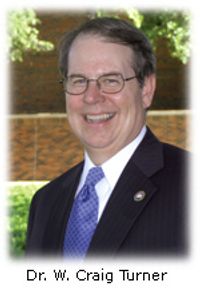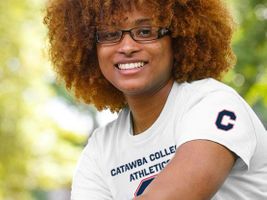
When Catawba College faculty and staff gathered for their annual fall conference on August 12th, it was an opportunity for the institution's new president, Dr. W. Craig Turner, to rally the troops before the start of a new academic year.
Turner, who said he had spent his first two months on the job doing more listening than talking, peppered his comments to employees with quotes from Mick Jagger, Bear Bryant, Heraclitus and his personal muse, Robert Browning. His overarching message was one of encouragement. "Each and every employee of Catawba College is important in creating the best opportunity possible for our students to learn," he said.
Following is a transcript of Turner's remarks:
OPENING CONFERENCE
August 12, 2008
I would like to turn our thoughts today to 3 key questions that I hope will be a major part of our conversation during the fall semester:
;-
;
- Who are we as an organization? As a college? As we move forward into the 21st century, what is Catawba's sense of itself?
The next 5-10 years in the life of Catawba will be defining years. You have a new president, of course, but I am talking about a much larger redefinition than merely a change in CAO (Chief Academic Officer).
As we baby boomers continue to phase out and retire, new leaders will become senior faculty and administration. But, again, I am talking about a still larger redefinition than that.
Heraclitus, the 6th century BC Greek philosopher said. "Everything in the universe is in a constant state of flux. The only constant is change and change changes in ever-changing directions at an ever-changing rate."
Never — in the history of humankind — has change changed so rapidly as it does today. In the summer of 2000 when I attended the Harvard New President's Seminar, we heard a dire prediction: In the next 25-50 years, half the private colleges and universities in the United States will either close their doors or merge with another/other institutions.
Who are we? What is Catawba to you? What is unique about it? What is lasting about it? Why will students move to Salisbury, N.C., live in our dorms, eat in our cafeteria, attend our classes, pay our tuition? What are they seeking that we can offer in exchange for four years of their lives and $100,000 of their or their parents' money?
There are several key issues involved here. Obviously, for example, no single person or group can completely "define" the college. Not the president, not the chief academic officer, not the faculty, not the staff, not the student body, not the alumni, not friends and donors, not even the trustees. All of these play a role in defining the college — willingly or unwillingly; wittingly or unwittingly.
While most of us seldom think in such terms, we all do it daily: in the classroom, at break, over lunch, at church, and at play; with our friends, co-workers, students, etc.
Some of us do it negatively — merely complaining. Not constructive criticism, not offering realistic solutions, but just griping. I am asking that we spend at least a semester not being negative but in conversation about meaningful issues that are important and for which we can seek positive solutions.
We must recognize, in the words of the imminent British philosopher, Sir Mick Jagger: "You can't always get what you want."
This leads me to our second question:
; - Who do we want to become?
Much more important than where we have been is the issue of where we are going. Don't misunderstand me: history is important, but only as we move beyond it. We should celebrate our success and traditions, and move on. And we should learn from our failures and mistakes, and move on.
Too often, we have a tendency to look back, not forward; to look down, not up. Robert Browning said, "Look not down, but up," and I would encourage you to make that your mantra this fall.
We need vision — not just a vision, but vision — the capacity to see and dream about the big picture. Helen Keller wrote: "The greatest tragedy of all is people who have sight but no vision." What is your vision for Catawba?
I have no illusion that this process of envisioning will be easy or accepted equally well by everyone. It is easier to move a cemetery than to change a college. But the questions we must be considering are what will higher education need to be in 5 years, 10 years, 25 years? What do our students really, truly need today to be educated for tomorrow? What competencies do they need to learn today to live meaningful, successful lives tomorrow and how can we deliver them?
Entelechy — a Greek word used by Aristotle that means something like "the vital force that contributes to growth." We could compare it to "catalyst," but it's more than that. The key to this Aristotelian concept is the actualizing of a person or an entity.
We need to promote entelechy this fall at Catawba College.
This leads to my third question.
; - How do we get to where we want to be? How do we actualize our visions?
A key question of the 21st century is, "How can we bring unity out of diversity?" How can we as a college with multiple constituencies come together and move Catawba to its next step—take it to the next level?
Paul "Bear" Bryant: "It is not the will to win that matters—everyone has that. It's the will to prepare to win."
Here are some of my thoughts to—hopefully—help us begin our discussion.
-
;
- We must be willing to question traditional ways of doing things.
If there is anything a liberal education should teach us it is to be open-minded—to be open to change in every area of the institution.
; - We must be fiscally aware and efficient.
We must look at new ways of doing things, give attention to details, but keep our focus on the whole.
; - We must attempt to understand and make the most of the dynamics of change.
As Heraclitus has so eloquently said, change is a constant: how are we going to deal with it?
; - We must learn to incorporate what our students learn into how they live.
"The world's no blot for us,/ Nor blank; it means intensely, and means good." Robert Browning "Fra Lippo Lippi"
Each and every employee of Catawba College is important in creating the best opportunity possible for our students to learn. The world we live in has meaning and we have an opportunity to help our students discover meaning.
Robert Browning has written so succinctly: "Measure your mind's height by the shade it casts." It's not just how much you know, but what good it's doing.
Theodore Roosevelt wrote: "It is not the critic who counts; not the man who points out how the strong man stumbles, or where the doer of deeds could have done them better. The credit belongs to the man who is actually in the arena, whose face is marred by dust and sweat and blood; who strives valiantly; who errs, and comes short again and again, because there is no effort without error and shortcoming, but who does actually strive to do the deeds; who knows the great enthusiasms, the great devotions; who spends himself in a worthy cause; who at best knows in the end the triumph of high achievement, and who at worst, if he fails, at least he fails while daring greatly, so that his place shall never be with those poor spirits who neither enjoy much nor suffer much because they live in the gray twilight that knows not victory nor defeat."
J.R.R. Tolkien wrote "The Hobbit," a story about a hobbit who had an adventure and lived life. Using that book as a premise, I would say to you, don't stay in the hole in the ground and be respectable, get out and have an adventure.
In closing, I would cite Robert Browning again from "Luria," "Look up, advance! All now is possible."
RELATED CONTENT:
